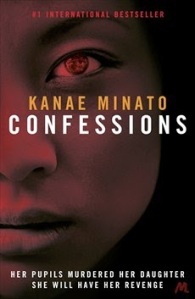Confessions - Kinae Minato
 Confessions is has been something of a phenomenon in Japan. It’s sold millions and has been adapted into a very successful film.
Confessions is has been something of a phenomenon in Japan. It’s sold millions and has been adapted into a very successful film.
It’s a short and lyrical book, told in clean, precise prose, about the escalating chain of events set in motion when two pupils kill the young daughter of their teacher.
The story unfolds in a series of monologues – the short chapters are told from half a dozen points of view – and you realise, somewhere along the way, that it’s a book about mothers and children. Kinae Minato - formerly a Japanese housewife - has seemingly tapped into some kind of malevolent tension between the generations pulsing beneath Japanese society – a pulling-apart of social and familial responsibility.
Confessions is great fun to read, though, and more than a little bonkers in the head. The first chapter is undoubtedly the strongest. The teacher Yuko Moriguchi’s uncannily calm and merciless final address to her class before her retirement sets up the themes of the book, and it ends in a doozy of a reveal.
There’s nobody to root for here, and nobody gets off scott free. Moriguchi lingers in the pages as an implacable and spiteful ghost in the machine and the two murderous pupils are both predators and victims. In one delightful subplot, the two killers become the target of a campaign of hate by the other kids within their class – it’s all very Lord Of The Flies. The only truly good character in the book dies slowly off stage.
I expect there are plenty of cultural subtleties in this book that passed me by – good grief, it wouldn’t be the first time – but, as with all international bestsellers, there’s a universal resonance buried somewhere beneath the pages of Confessions. A hateful and macabre fairy tale, there’s more than a touch of the Brothers Grimm in its gleeful treatment of its characters.
Be warned: this isn’t a story chained to narrative logic, the reader is required to make a few leaps of faith, and I’m not sure I’m as enamoured of it as other reviewers have been. It’s an enjoyable read, certainly, but the writing is cold and the characters are mostly charmless.
Confessions sticks in your throat like lighter fluid. It’s a book that wears a terrible frown, and certainly isn’t as playful and sly as Pascal Garnier’s equally macabre and creepy novellas. But if you’re looking for something more tart than the usual formulaic genre fare, you could do worse than flush yourself down the moral plughole with this acidic and – in the best sense of the word – nasty little book.
If you read crime fiction because you enjoy simple black and white morality tales in which good vanquishes evil, then Confessions may give you a touch of indigestion, but it’s certainly a tale well told. And, at 240 pages or so, will certainly not keep you too long from the important business of thinking positive thoughts.
Many thanks to Mulholland Books for the review copy of Confessions.

